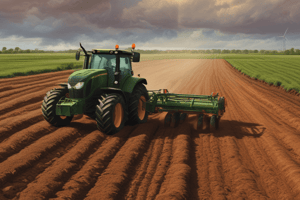Podcast
Questions and Answers
What is a key aspect of soil health in agriculture?
What is a key aspect of soil health in agriculture?
- Minimizing the use of cover crops
- Enhancing soil aeration and structure (correct)
- Maximizing water retention in crops
- Reducing organic matter in soil
Which practice is part of sustainable crop production?
Which practice is part of sustainable crop production?
- Use of chemical fertilizers only
- Excessive tillage
- Monoculture farming
- Integrated Pest Management (IPM) (correct)
What is a benefit of sustainable grazing practices?
What is a benefit of sustainable grazing practices?
- Complete reliance on grain feeding
- Usage of antibiotics in feed
- Prevention of overgrazing (correct)
- Increased livestock density
What is one of the economic aspects essential for farmers?
What is one of the economic aspects essential for farmers?
Which technological innovation is utilized in precision agriculture?
Which technological innovation is utilized in precision agriculture?
Flashcards are hidden until you start studying
Study Notes
Ag 16 Fundamental
-
Definition: Ag 16 refers to fundamental principles, concepts, or standards related to agriculture, which may pertain to soil health, crop production, livestock management, and sustainability practices.
-
Core Components:
-
Soil Health:
- Importance of soil aeration, structure, and fertility.
- Role of organic matter and microbial activity.
- Techniques for soil testing and amendments.
-
Crop Production:
- Selection of appropriate crops based on climate and soil type.
- Integrated Pest Management (IPM) practices for sustainable crop protection.
- Crop rotation and cover cropping for nutrient cycling and pest reduction.
-
Livestock Management:
- Best practices for breeding, feeding, and health management of livestock.
- Importance of animal welfare and ethical treatment.
- Sustainable grazing practices to prevent overgrazing.
-
Sustainability Practices:
- Definition of sustainable agriculture and its importance.
- Use of renewable resources and energy-efficient technologies.
- Conservation practices to protect biodiversity and ecosystems.
-
-
Economic Aspects:
- Importance of market knowledge and pricing strategies.
- Financial management in farming and budgeting techniques.
-
Regulatory Standards:
- Overview of agricultural policies and regulations that ensure quality and safety.
- Understanding certifications (e.g., organic, sustainable) and their benefits.
-
Technological Innovations:
- Role of precision agriculture and digital farming tools.
- Use of drones, sensors, and AI in monitoring crop health and yield prediction.
Conclusion
Ag 16 fundamental embodies the essential principles of agriculture aimed at improving productivity, sustainability, and economic viability within the sector. Understanding these components is critical for effective agricultural practice.
Soil Health
- Soil aeration, structure, and fertility contribute to overall soil health
- Organic matter and microbial activity play a vital role in soil health
- Soil testing and amendments help maintain healthy soils
Crop Production
- Crop selection should be based on climate and soil type for optimal growth
- Integrated Pest Management (IPM) is a sustainable approach to crop protection
- Crop rotation and cover cropping enhance nutrient cycling and reduce pest pressure
Livestock Management
- Proper breeding, feeding, and health management are crucial aspects of livestock care
- Animal welfare and ethical treatment are essential for responsible livestock management
- Sustainable grazing practices help prevent overgrazing and maintain ecosystem health
Sustainability Practices
- Sustainable agriculture aims to balance environmental, economic, and social considerations
- Renewable resources and energy-efficient technologies are key components of sustainable practices
- Conservation practices protect biodiversity and ecosystems
Economic Aspects
- Market knowledge and pricing strategies influence profitability in agriculture
- Financial management and budgeting techniques are essential for successful farming operations
Regulatory Standards
- Agricultural policies and regulations ensure quality and safety standards
- Certifications such as organic and sustainable demonstrate adherence to specific standards and offer benefits to producers and consumers
Technological Innovations
- Precision agriculture and digital farming tools enhance efficiency and sustainability
- Drones, sensors, and AI applications provide real-time insights for crop health monitoring and yield prediction
Studying That Suits You
Use AI to generate personalized quizzes and flashcards to suit your learning preferences.




